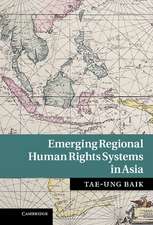General Principles of Law - The Role of the Judiciary: Ius Gentium: Comparative Perspectives on Law and Justice, cartea 46
Editat de Laura Pineschien Limba Engleză Hardback – iul 2015
This volume is organized in four sections, where the topic is mainly explored from a comparative perspective, and includes case studies. The first section covers theoretical issues. It offers an analysis of principles in shaping Dworkin’s theories about international law, a reflection on the role of procedural principles in defining the role of the judiciary, a view on the role of general principles in transnational judicial communication, a study on the recognition of international law from formal criteria to substantive principles, and an inquiry from the viewpoint of neo-constitutionalism.
The second section contains studies on the role of general principles in selected legal systems, including International Law, European Union Law as well as Common Law systems. The third section features an analysis of select legal principles in a comparative perspective, with a particular focus on the comparison between European and American experiences.
The fourth and last section explores selected principles in given areas of law, including the misuse of the lex specialis principle in the relationship between international human rights law and international humanitarian law, the role of the judiciary in Poland as regards discrimination for sexual orientation, and the impact of the ECtHR case law on Italian criminal law with regard to the principle of legality.
Overall, the book offers readers a thoughtful reflection on how the interpretation, application, and development of general principles of law by the judiciary contribute to the evolution of legal systems at both the domestic and international levels as well as
further their reciprocal interactions.
| Toate formatele și edițiile | Preț | Express |
|---|---|---|
| Paperback (1) | 642.68 lei 6-8 săpt. | |
| Springer International Publishing – 17 oct 2016 | 642.68 lei 6-8 săpt. | |
| Hardback (1) | 649.06 lei 6-8 săpt. | |
| Springer International Publishing – iul 2015 | 649.06 lei 6-8 săpt. |
Din seria Ius Gentium: Comparative Perspectives on Law and Justice
- 20%
 Preț: 1128.14 lei
Preț: 1128.14 lei - 20%
 Preț: 1565.15 lei
Preț: 1565.15 lei - 18%
 Preț: 1115.28 lei
Preț: 1115.28 lei - 18%
 Preț: 904.28 lei
Preț: 904.28 lei - 18%
 Preț: 1001.81 lei
Preț: 1001.81 lei -
 Preț: 180.18 lei
Preț: 180.18 lei - 24%
 Preț: 787.30 lei
Preț: 787.30 lei - 18%
 Preț: 1115.28 lei
Preț: 1115.28 lei - 15%
 Preț: 635.31 lei
Preț: 635.31 lei - 18%
 Preț: 1108.67 lei
Preț: 1108.67 lei - 18%
 Preț: 1007.97 lei
Preț: 1007.97 lei - 18%
 Preț: 784.79 lei
Preț: 784.79 lei - 18%
 Preț: 1223.11 lei
Preț: 1223.11 lei - 18%
 Preț: 891.02 lei
Preț: 891.02 lei - 18%
 Preț: 1009.40 lei
Preț: 1009.40 lei - 18%
 Preț: 1005.74 lei
Preț: 1005.74 lei - 18%
 Preț: 1014.89 lei
Preț: 1014.89 lei - 18%
 Preț: 896.70 lei
Preț: 896.70 lei - 15%
 Preț: 641.85 lei
Preț: 641.85 lei - 18%
 Preț: 779.71 lei
Preț: 779.71 lei - 18%
 Preț: 1010.79 lei
Preț: 1010.79 lei - 18%
 Preț: 1010.03 lei
Preț: 1010.03 lei - 18%
 Preț: 950.52 lei
Preț: 950.52 lei - 15%
 Preț: 638.76 lei
Preț: 638.76 lei - 18%
 Preț: 947.50 lei
Preț: 947.50 lei - 20%
 Preț: 564.76 lei
Preț: 564.76 lei - 18%
 Preț: 1115.14 lei
Preț: 1115.14 lei - 18%
 Preț: 944.82 lei
Preț: 944.82 lei - 15%
 Preț: 635.80 lei
Preț: 635.80 lei - 15%
 Preț: 637.59 lei
Preț: 637.59 lei - 15%
 Preț: 643.65 lei
Preț: 643.65 lei - 24%
 Preț: 809.15 lei
Preț: 809.15 lei
Preț: 649.06 lei
Preț vechi: 763.60 lei
-15% Nou
Puncte Express: 974
Preț estimativ în valută:
124.20€ • 130.27$ • 103.39£
124.20€ • 130.27$ • 103.39£
Carte tipărită la comandă
Livrare economică 01-15 aprilie
Preluare comenzi: 021 569.72.76
Specificații
ISBN-13: 9783319191799
ISBN-10: 3319191799
Pagini: 297
Ilustrații: XVIII, 325 p.
Dimensiuni: 155 x 235 x 25 mm
Greutate: 0.66 kg
Ediția:2015
Editura: Springer International Publishing
Colecția Springer
Seria Ius Gentium: Comparative Perspectives on Law and Justice
Locul publicării:Cham, Switzerland
ISBN-10: 3319191799
Pagini: 297
Ilustrații: XVIII, 325 p.
Dimensiuni: 155 x 235 x 25 mm
Greutate: 0.66 kg
Ediția:2015
Editura: Springer International Publishing
Colecția Springer
Seria Ius Gentium: Comparative Perspectives on Law and Justice
Locul publicării:Cham, Switzerland
Public țintă
ResearchCuprins
Foreword; Mortimer N.S. Sellers.- Introduction; Laura Pineschi.- Part I General Principles and the Judiciary: Legal Theory and Courts’ Interactions.- Principles and Disagreements in International Law (with a View from Dworkin’s Legal Theory); Gianluigi Palombella.- Legal Formalism, Procedural Principles, and Judicial Constraint in American Adjudication; Christopher J. Peters.- General Principles of Law and Transnational Judicial Communication; Elaine Mak.- Recognition of International Law: From Formal Criteria to Substantive Principles; Leonardo Marchettoni.- The “Doctrine of Principles” in Neo-Constitutional Theories and the Principle of Reasonableness in Action; Francesco De Vanna.- Part II General Principles and the Judiciary: Legal Systems and Domestic Frameworks; Judicial Control of Juries and Just Results in the Common Law System: A Historical Perspective; Frederic N. Smalkin.- General Principles of International Law: Struggling with a Slippery Concept; Elena Carpanelli.- “Please Handle with Care!” – Some Considerations on the Approach of the European Court of Justice to the Direct Effect of General Principles of European Union Law; Nicole Lazzerini.- Part III General Principles and the Judiciary in a Comparative Perspective.- Principio di determinatezza and the Void-for-Vagueness Doctrine in Constitutional Litigation: The Italian Corte costituzionale and the United States Supreme Court; Michele Boggiani.- Antidiscrimination Law and Limits of the Power of Dismissal: A Comparative Analysis of the Legislation and Case Law in United States and Italy; Fabio Pantano.- Principle of Non-Discrimination on the Ground of Sexual Orientation and Same-sex Marriage. A Comparison between United States and European Case Law; Veronica Valenti.- Healthcare Right and Principle of “Minimum Standards”: The Interpretation of the Judiciary in a Comparative Perspective; Monica Cappelletti.- Part IV The Role
of the Judge and General Principles in Selected Issues and Case Studies.- The (Mis-)Use of General Principles of Law: Lex specialis and the Relationship between International Human Rights Law and the Laws of Armed Conflict; Silvia Borelli.- Discrimination for Sexual Orientation in Poland: The Role of the Judiciary; Katarzyna Girdwoyń.- Principle of Legality and Role of the Judiciary in Criminal Law: The Influence of the ECtHR Case Law on the Italian Legal System; Francesco Mazzacuva.
of the Judge and General Principles in Selected Issues and Case Studies.- The (Mis-)Use of General Principles of Law: Lex specialis and the Relationship between International Human Rights Law and the Laws of Armed Conflict; Silvia Borelli.- Discrimination for Sexual Orientation in Poland: The Role of the Judiciary; Katarzyna Girdwoyń.- Principle of Legality and Role of the Judiciary in Criminal Law: The Influence of the ECtHR Case Law on the Italian Legal System; Francesco Mazzacuva.
Textul de pe ultima copertă
This book examines the role played by domestic and international judges in the “flexibilization” of legal systems through general principles. It features revised papers that were presented at the Annual Conference of the European-American Consortium for Legal Education, held at the University of Parma, Italy, May 2014.
This volume is organized in four sections, where the topic is mainly explored from a comparative perspective, and includes case studies. The first section covers theoretical issues. It offers an analysis of principles in shaping Dworkin’s theories about international law, a reflection on the role of procedural principles in defining the role of the judiciary, a view on the role of general principles in transnational judicial communication, a study on the recognition of international law from formal criteria to substantive principles, and an inquiry from the viewpoint of neo-constitutionalism.
The second section contains studies on the role of general principles in selected legal systems, including International Law, European Union Law as well as Common Law systems. The third section features an analysis of select legal principles in a comparative perspective, with a particular focus on the comparison between European and American experiences.
The fourth and last section explores selected principles in given areas of law, including the misuse of the lex specialis principle in the relationship between international human rights law and international humanitarian law, the role of the judiciary in Poland as regards discrimination for sexual orientation, and the impact of the ECtHR case law on Italian criminal law with regard to the principle of legality.
Overall, the book offers readers a thoughtful reflection on how the interpretation, application, and development of general principles of law by the judiciary contribute to the evolution of legal systems at both the domestic and international levels as well as
further their reciprocal interactions.
This volume is organized in four sections, where the topic is mainly explored from a comparative perspective, and includes case studies. The first section covers theoretical issues. It offers an analysis of principles in shaping Dworkin’s theories about international law, a reflection on the role of procedural principles in defining the role of the judiciary, a view on the role of general principles in transnational judicial communication, a study on the recognition of international law from formal criteria to substantive principles, and an inquiry from the viewpoint of neo-constitutionalism.
The second section contains studies on the role of general principles in selected legal systems, including International Law, European Union Law as well as Common Law systems. The third section features an analysis of select legal principles in a comparative perspective, with a particular focus on the comparison between European and American experiences.
The fourth and last section explores selected principles in given areas of law, including the misuse of the lex specialis principle in the relationship between international human rights law and international humanitarian law, the role of the judiciary in Poland as regards discrimination for sexual orientation, and the impact of the ECtHR case law on Italian criminal law with regard to the principle of legality.
Overall, the book offers readers a thoughtful reflection on how the interpretation, application, and development of general principles of law by the judiciary contribute to the evolution of legal systems at both the domestic and international levels as well as
further their reciprocal interactions.
Caracteristici
Covers a key topic for understanding the role of the judiciary in a globalized legal context Deals with an aspect often neglected by legal writers: the role played by domestic and international judges in the “flexibilization” of legal systems through general principles Includes reflections on fundamental principles as legal constraints to unfettered judicial discretion? Features a comparative perspective and includes case studies Includes supplementary material: sn.pub/extras















